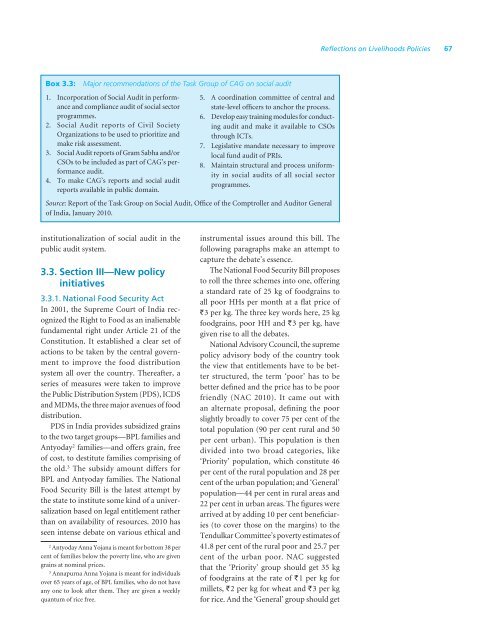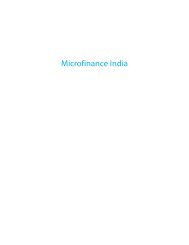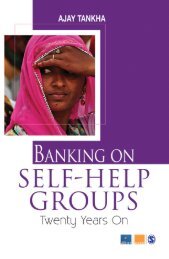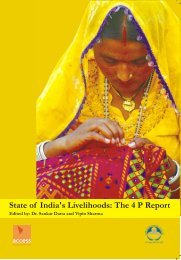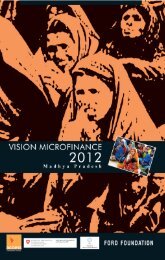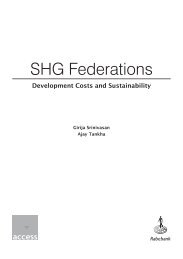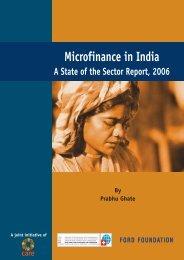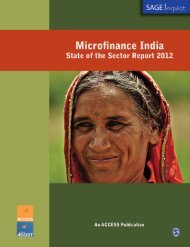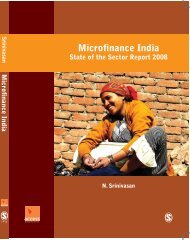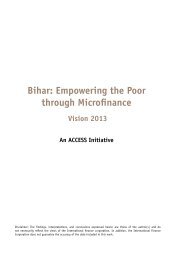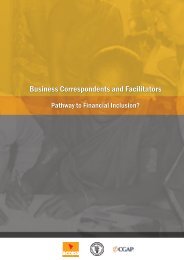SOIL Report 2011 - ACCESS Development Services
SOIL Report 2011 - ACCESS Development Services
SOIL Report 2011 - ACCESS Development Services
- No tags were found...
Create successful ePaper yourself
Turn your PDF publications into a flip-book with our unique Google optimized e-Paper software.
Reflections on Livelihoods Policies 67Box 3.3: Major recommendations of the Task Group of CAG on social audit1. Incorporation of Social Audit in performanceand compliance audit of social sectorprogrammes.2. Social Audit reports of Civil SocietyOrganizations to be used to prioritize andmake risk assessment.3. Social Audit reports of Gram Sabha and/orCSOs to be included as part of CAG’s performanceaudit.4. To make CAG’s reports and social auditreports available in public domain.5. A coordination committee of central andstate-level officers to anchor the process.6. Develop easy training modules for conductingaudit and make it available to CSOsthrough ICTs.7. Legislative mandate necessary to improvelocal fund audit of PRIs.8. Maintain structural and process uniformityin social audits of all social sectorprogrammes.Source: <strong>Report</strong> of the Task Group on Social Audit, Office of the Comptroller and Auditor Generalof India, January 2010.institutionalization of social audit in thepublic audit system.3.3. Section III—New policyinitiatives3.3.1. National Food Security ActIn 2001, the Supreme Court of India recognizedthe Right to Food as an inalienablefundamental right under Article 21 of theConstitution. It established a clear set ofactions to be taken by the central governmentto improve the food distributionsystem all over the country. Thereafter, aseries of measures were taken to improvethe Public Distribution System (PDS), ICDSand MDMs, the three major avenues of fooddistribution.PDS in India provides subsidized grainsto the two target groups—BPL families andAntyoday 2 families—and offers grain, freeof cost, to destitute families comprising ofthe old. 3 The subsidy amount differs forBPL and Antyoday families. The NationalFood Security Bill is the latest attempt bythe state to institute some kind of a universalizationbased on legal entitlement ratherthan on availability of resources. 2010 hasseen intense debate on various ethical and2Antyoday Anna Yojana is meant for bottom 38 percent of families below the poverty line, who are givengrains at nominal prices.3Annapurna Anna Yojana is meant for individualsover 65 years of age, of BPL families, who do not haveany one to look after them. They are given a weeklyquantum of rice free.instrumental issues around this bill. Thefollowing paragraphs make an attempt tocapture the debate’s essence.The National Food Security Bill proposesto roll the three schemes into one, offeringa standard rate of 25 kg of foodgrains toall poor HHs per month at a flat price of`3 per kg. The three key words here, 25 kgfoodgrains, poor HH and `3 per kg, havegiven rise to all the debates.National Advisory Ccouncil, the supremepolicy advisory body of the country tookthe view that entitlements have to be betterstructured, the term ‘poor’ has to bebetter defined and the price has to be poorfriendly (NAC 2010). It came out withan alternate proposal, defining the poorslightly broadly to cover 75 per cent of thetotal population (90 per cent rural and 50per cent urban). This population is thendivided into two broad categories, like‘Priority’ population, which constitute 46per cent of the rural population and 28 percent of the urban population; and ‘General’population—44 per cent in rural areas and22 per cent in urban areas. The figures werearrived at by adding 10 per cent beneficiaries(to cover those on the margins) to theTendulkar Committee’s poverty estimates of41.8 per cent of the rural poor and 25.7 percent of the urban poor. NAC suggestedthat the ‘Priority’ group should get 35 kgof foodgrains at the rate of `1 per kg formillets, `2 per kg for wheat and `3 per kgfor rice. And the ‘General’ group should get


